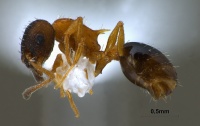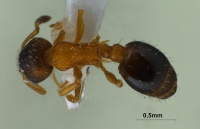Temnothorax nassonovi
| Temnothorax nassonovi | |
|---|---|

| |
| Scientific classification | |
| Kingdom: | Animalia |
| Phylum: | Arthropoda |
| Class: | Insecta |
| Order: | Hymenoptera |
| Family: | Formicidae |
| Subfamily: | Myrmicinae |
| Tribe: | Crematogastrini |
| Genus: | Temnothorax |
| Species group: | palearctic |
| Species: | T. nassonovi |
| Binomial name | |
| Temnothorax nassonovi (Ruzsky, 1895) | |
| Synonyms | |
| |
Inhabits mainly steppe and dry meadows, nests are built in soil (Zryanin & Zryanina, 2007). It has been found nesting together with Temnothorax mongolicus in the Russian Federation. Unfortunately, details of this cohabitation are unknown, however it is likely one is an inquiline of the other (Antonov et al., 2024).
Identification
Prebus (2017) - A member of the Palearctic clade.
The differences between this species and the similar Temnothorax argentipes are given in notes about the latter species.
Keys including this Species
Distribution
Radchenko (2004) - Steppe and forest-steppe zones from the eastern Ukraine to the Pacific Ocean, Tien-Shan; absent from Japan.
Latitudinal Distribution Pattern
Latitudinal Range: 53.73° to 37.12309°.
| North Temperate |
North Subtropical |
Tropical | South Subtropical |
South Temperate |
- Source: AntMaps
Distribution based on Regional Taxon Lists
Palaearctic Region: Democratic Peoples Republic of Korea, Kyrgyzstan, Mongolia, Republic of Korea, Russian Federation (type locality), Ukraine.
Distribution based on AntMaps
Distribution based on AntWeb specimens
Check data from AntWeb
Countries Occupied
| Number of countries occupied by this species based on AntWiki Regional Taxon Lists. In general, fewer countries occupied indicates a narrower range, while more countries indicates a more widespread species. |

|
Estimated Abundance
| Relative abundance based on number of AntMaps records per species (this species within the purple bar). Fewer records (to the left) indicates a less abundant/encountered species while more records (to the right) indicates more abundant/encountered species. |

|
Biology
Zryanin & Zryanina (2007) found nests of this species in soil in steppe habitats.
Association with Other Organisms
 Explore: Show all Associate data or Search these data. See also a list of all data tables or learn how data is managed.
Explore: Show all Associate data or Search these data. See also a list of all data tables or learn how data is managed.
This species is a inquiline for the ant Temnothorax mongolicus (a inquiline) in Russian Federation (Antonov et al., 2024) (co-occur in nests, relationship details unknown).
Castes
Nomenclature
The following information is derived from Barry Bolton's Online Catalogue of the Ants of the World.
- nassonovi. Leptothorax nassanowi Ruzsky, 1895: 26 (w.) RUSSIA. [Also described as new by Ruzsky, 1896: 72.] [Justified emendation of spelling to nassonovi: Ruzsky, 1896: 72.] Kupyanskaya, 1990: 143 (q.m.). Combination in Temnothorax: Bolton, 2003: 271. Status as species: Ruzsky, 1905b: 579; Karavaiev, 1916: 498; Karavaiev, 1934: 140 (redescription); Arnol'di, 1971: 1825 (in key); Tarbinsky, 1976: 94 (redescription); Arnol'di & Dlussky, 1978: 543 (in key); Radchenko, 1994b: 111 (in key); Radchenko, 1994d: 155 (in key); Radchenko, 1995d: 9; Lyu & Cho, 2003b: 272; Radchenko, 2004: 126; Radchenko, 2005b: 151; Zhou, et al. 2010: 11 (in key). Senior synonym of firssovi: Kupyanskaya, 1990: 143; Radchenko, 1995d: 9. Senior synonym of subnudus: Radchenko, 1995d: 9; Radchenko, 2005b: 151. Senior synonym of galeatus: Radchenko, 2004: 126.
- subnudus. Leptothorax nassonovi var. subnudus Ruzsky, 1905b: 581 (w.) CHINA. Junior synonym of nassanowi: Radchenko, 1995d: 9; Radchenko, 2005b: 151.
- galeatus. Leptothorax galeatus Wheeler, W.M. 1927e: 1 (w.) CHINA. Combination in Temnothorax: Bolton, 2003: 271. Junior synonym of nassanowi: Radchenko, 2004: 126.
- firssovi. Leptothorax nassonovi subsp. firssovi Kuznetsov-Ugamsky, 1928b: 28, fig. 5 (w.) RUSSIA. [Misspelled as frissovi by Pisarski, 1969b: 302.] Junior synonym of nassanowi: Kupyanskaya, 1990: 143.
Unless otherwise noted the text for the remainder of this section is reported from the publication that includes the original description.
Description
Type Material
Radchenko (2004) - Syntypes of L. nassonovi: 2 workers, vicinity of Simbirsk, vi.1894 (Zoological Museum of the Moscow State University).
The types of the var. subnudus seem to be lost. Ruzsky (1905) noted that this variety differs from the “typical” T. nassonovi by the very sparse standing hairs on the body (sometimes hairs are totally absent), by a somewhat different colour of the head dorsum, and the presence of the yellow spot at the base of the first gastral tergite. The two latter features are quite variable, but the absence of standing hairs is a quite significant character. Conspecificity (or dissimilarity) of these two forms can be definitely resolved only after obtaining an additional material from the type locality (Manchuria) of var. subnudus.
I have investigated 2 workers of Leptothorax galeatus, preserved in the collection of MCZ. One worker labelled “Peking, China, P. H. Lefivre”, “M.C.Z. Type 7 21025” was designated by A. Schulz in 1997 as the lectotype, and a second specimen from Tsinghua (for details see above) is labelled as paralectotype. Nevertheless, Wheeler (1927) described L. galeatus based only on “A single specimen from Tsinhgua (Gee)” (loc. cit., p. 2), which is the holotype according to the International Code of Zoological Nomenclature. The second specimen from Peking, designated as the lectotype, does not belong to the type series.
References
- Antonov, I.A., Yusupov, Z.M., Csősz, S., Chesnokova, S.V. 2024. First record of Temnothorax mongolicus (Pisarski, 1969) (Hymenoptera, Formicidae) from Irkutskaya Oblast of East Siberia, Russia. Euroasian Entomological Journal 23(1): 26–30 (doi:10.15298/euroasentj.23.01.05).
- Borowiec, L. 2014. Catalogue of ants of Europe, the Mediterranean Basin and adjacent regions (Hymenoptera: Formicidae). Genus (Wroclaw) 25(1-2): 1-340.
- Csősz, S., Salata, S. & Borowiec, L. 2018. Three Turano-European species of the Temnothorax interruptus group (Hymenoptera: Formicidae) demonstrated by quantitative morphology. Myrmecological News 26: 101-119.
- Kim, G., Lyu, D. 2012. Distribution of Ants (Insecta, Hymenoptera) in Chiaksan Mountain, Prov. Gangweon, Korea. Journal of Korean Nature 5, 127–129 (doi:10.7229/jkn.2012.5.2.127).
- Kwon, T.-S. 2015. Ant assemblages along the Baekdudaegan Mountain Range in South Korea: Human roads and temperature niche. Journal of Asia-Pacific Biodiversity 8, 152–157 (doi:10.1016/j.japb.2015.05.001).
- Prebus, M. 2017. Insights into the evolution, biogeography and natural history of the acorn ants, genus Temnothorax Mayr (hymenoptera: Formicidae). Bmc Evolutionary Biology. 17:250. doi:10.1186/s12862-017-1095-8 (The doi link to the publication's journal webpage provides access to the 24 files that accompany this article).
- Ruzsky, M. 1895. Faunistic investigations in east Russia 1. Contribution to the ant fauna of east Russia. 2. Zoological excursion in the Orenburg region in 1894. Tr. Obshch. Estestvoispyt. Imp. Kazan. Univ. 28(5 5: 1-32
- Zhou, S., Huang, J., Yu, D., Liu, Z. 2010. Eight new species and three newly recorded species of the ant genus Temnothorax Mayr (Hymenoptera: Formicidae) from the Chinese mainland, with a key. Sociobiology. 56(1):7-26.
- Zryanin, V.A. and Zryanina, T.A. 2007. Novye dannye o faune murav’ev Srednego Povolzh’ya. Uspekhi Sovremennoj Biologii. 127:226-240. [in Russian]
References based on Global Ant Biodiversity Informatics
- Aibek U., C. Sonomdagva, and S. Yamane. 2006. A preliminary survey on the species composition and nesting habits of ants in the Bogdkhan Mountain region, North Central Mongolia. ANeT Newsletter 8: 11-15.
- Bayartogtokh B., U. Aibek, S. Yamane, and M. Pfeiffer. 2014. Diversity and biogeography of ants in Mongolia (Hymenoptera: Formicidae). Asian Myrmecology 6: 1-20.
- Borowiec L. 2014. Catalogue of ants of Europe, the Mediterranean Basin and adjacent regions (Hymenoptera: Formicidae). Genus (Wroclaw) 25(1-2): 1-340.
- Chang Y.-D., D. H. He. 2001. A taxonomic study of the ant genus Leptothorax from northwestern China. Journal of Ningxia Agricultural College. 22:(2) 1-4.
- Choi B.M., Kim, C.H., Bang, J.R. 1993. Studies on the distribution of ants (Formicidae) in Korea (13). A checklist of ants from each province (Do), with taxonomic notes. Cheongju Sabom Taehakkyo Nonmunjip (Journal of Cheongju National University of Education) 30: 331-380.
- Collingwood C. A. 1976. Ants (Hymenoptera: Formicidae) from North Korea. Annales Historico-Naturales Musei Nationalis Hungarici 68:
- Collingwood C. A. 1981. Ants (Hymenoptera: Formicidae) from Korea, 2. Folia Entomologica Hungarica 42(34): 25-30.
- Czechowski W., A. Radchenko, W. Czechowska and K. Vepsäläinen. 2012. The ants of Poland with reference to the myrmecofauna of Europe. Fauna Poloniae 4. Warsaw: Natura Optima Dux Foundation, 1-496 pp
- Dubovikoff D. A., and Z. M. Yusupov. 2018. Family Formicidae - Ants. In Belokobylskij S. A. and A. S. Lelej: Annotated catalogue of the Hymenoptera of Russia. Proceedingss of the Zoological Institute of the Russian Academy of Sciences 6: 197-210.
- Guénard B., and R. R. Dunn. 2012. A checklist of the ants of China. Zootaxa 3558: 1-77.
- Ha S.J, S.J. Park, and B.J. Kim. 2002. Comparative ant faunas between Seonyudo and seven other islands of West Sea in Korea. Korean Journal of Entomology 32(2): 75-79.
- Kim B.J. 1996. Synonymic list and distribution of Formicidae (Hymenoptera) in Korea. Entomological Research Bulletin Supplement 169-196.
- Kwon T. S. 2015. Ant assemblages along the Baekdudaegan Mountain Range in South Korea: Human roads and temperature niche. Journal of Asia-Pacific Biodiversity 8: 152-157.
- Lelej A. S. 2012. Annotated catalogue of the Insects of Russian Far East. Volume 1. Hymenoptera. Dalnauka: Vladivostok. 635 p.
- Paik W.H. 1984. A checklist of Formicidae (Hymenoptera) of Korea. Korean J. Plant Prot. 23(3): 193-195.
- Pfeiffer, M., L. Chimedregzen and K. Ulykpan. 2003. Community organization and species richness of ants (Hymenoptera/Formicidae) in Mongolia along an ecological gradient from steppe to Gobi desert. Journal of Biogeography 30(12):1921-1925
- Radchenko A. 2004. A review of the ant genera Leptothorax Mayr and Temnothorax Mayr (Hymenoptera, Formicidae) of the eastern Palaearctic. Acta Zoologica Academiae Scientiarum Hungaricae 50:109-137.
- Radchenko, A. 2005. Monographic revision of the ants (Hymenoptera: Formicidae) of North Korea. Annales Zoologici (Warsaw) 55: 127-221.
- Radchenko, A. 2005. Monographic revision of the ants (Hymenoptera, Formicidae) of North Korea. Annales Zoologici 55(2): 127-221.
- Reznikova Z. I. 2003. Distribution patterns of ants in different natural zones and landscapes in Kazakhstan and West Siberia along a meridian trend. Euroasian Entomological Journal 2(4): 235-342.
- Schultz, R., A. G. Radchenko, and B. Seifert. "A critical checklist of the ants of Kyrgyzstan (Hymenoptera: Formicidae)." Myrmecologische Nachrichten 8 (2006): 201-207.
- So, Ha, Seong, Jin, Park, Joon and Byung, and Kim, Jin. 2002. Comparitive Ant Faunas between Seonyudo and Seven other Islands of West Sea in Korea. Korean Journal of Entomology. 32:75-79.
- Terayama M., Choi, B.M., Kim, C.H. 1992. A check list of ants from Korea, with taxonomic notes. Bulletin of the Toho Gakuen 7:19-54.
- Terayama M., R. B. Kuranishi, and A. Saito. 2000. Ants (Hymenoptera: Formicidae) from the Kamchatka Peninsula and Paramushir Island, North Kuril Islands. Nat. His. Res., Special Issue 7: 291-294.
- Terayama. M. 2004. Geological and ecological distribution of Japanese ants communities. (translated from Japanese) Reports of the Saitama Prefecture Animal Research Association. 48:24

